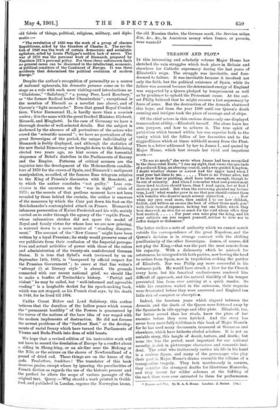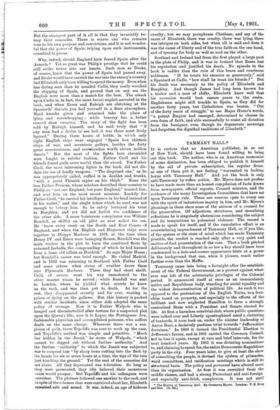TREASON AND PLOT.* IN this interesting and scholarly volume Major
Hume has sketched the vain struggles which took place in Britain and elsewhere for Catholic supremacy during the last years of Elizabeth's reign. The struggle was inevitable, and fore- doomed to failure. It was inevitable because it involved not
only the faith, but the political existence of Spain, while its failure was assured because the determined energy of England
was supported by a Queen pledged by temperament as well as by prudence to uphold the Protestant cause. At the out- set Philip believed that he might recover a lost supremacy by force of arms. But the destruction of the Armada shattered this hope, and from the year 1589 until our Queen's death cunning and intrigue took the place of courage and of ships.
Of the chief actors in this curious drama only one displayeL transcendent ability,—Elizabeth herself. She alone knew her own purpose, and how to achieve it. The true spirit of patriotism which burned within her was superior both to the vanity which hid the follies of her favourites and to the niggardliness which at times withheld money from the Fleet.
There is a letter addressed by her to James I., and quoted by Major Hume, which best reveals her vivid and impatient scorn :—
" To see so much," she wrote when James had been reconciled to the three rebel Earls," I rue my sight, that views the spectacle of a seduced King, an abasing council, and a wry-guided Kingdom. I doubt whether shame or sorrow had the upper hand when I read your last lines to me There is no Prince alive, but if he show fear or yielding, shall have tutors enough, though he be out of minority. And when I remember what sore punishment these lewd traitors should have, then I read again, lest at first I mistook your mind. But when the reviewing granted my lecture true, Lord ! what wonder grew in me that you should correct them
with benefits who deserve much severer correctim Now when my eyes read more, then smiled I to see how childish, foolish, and witless an excuse the best of either three mado you! with their items of expenses, lacking but one billet, which they best deserved, an item for so much for the cord whose office they best merited For your own sake play the King, and let your subjects see you respect yourself, neither to hide nor to suffer danger or dishonour."
The letter strikes a note of authority which we cannot match
outside the correspondence of the great Napoleon, and the Queen's decision is in strange contrast with the shifting pusillanimity of the other Sovereigns. James, of course, did not play the King,—that was the part the most remote from his capacity. With a dishonesty Mild' he mistook for astuteness, he intrigued with both parties, now bowing the head to orders from Spain, now in trepidation seeking the pardon of Elizabeth. Nor was Philip any more successful in his tortuous path. He would have struck a blow for the Church every hour, but his fanatical exclusiveness rendered him difficult of approach, and the natural timidity of his temper prevented him from ever arriving at a quick resolve. So while his creatukres waited in the anteroom, their requests were frustrated before they were answered, and England ran little risk of conquest or absorption.
Indeed, the fourteen years which elapsed between the Armada and the death of the Queen were frittered away by the Spaniards in idle spyings and idler plots. Elizabeth, too, far better served than her rivals, knew the plots of her enemies before they were hatched. And the story has never been more fully told than in this book of Major Hume's, for he has used many documents, treasured at Simancas and elsewhere, which have hitherto eluded scholars. It is not an amiable story, this tangle of deceit, torture, and death ; but none the less the period, most important for our national security. is rich in picturesque characters and romantic inci- dent. The rebel who traitorously carries his life in his hand is a curious figure, and many of the personages who play their part in Major Hume's drama resemble the villains of a transpontine tragedy. They lurk murderously in corners, they contrive the strangest deaths for illustrious Monarchs, and they invent far wilder schemes at the bidding of the rack than were ever entrusted to them for performance.
• Treason awl Plot. By H. A. B. Hume. Loudon a J. Nisbet. [16s.1 But the strangest part of it all is that they invariably be- tray their comrades. There is scarce one who remains true to his own purpose and convictions, and it is not wonder- ful that the power of Spain, relying upon such instruments, crumbled to pieces.
Why, indeed, should England have feared Spain after the Armada ? Yet so great was Philip's prestige that he could still strike terror into our hearts. Such men as Drake, of course, knew that the power of Spain had passed away, and Drake would have carried the war into the enemy's country had Elizabeth only been willing to spend the money. Even when less daring men than he assailed Cadiz, they easily wrecked the shipping of Spain, and proved that on any sea the English were more than a match for the best. The attack upon Cadiz is, in fact, the most heroic exploit narrated in the book, and when Essex and Raleigh are clutching at the Spaniards' throats you feel yourself in a finer atmosphere. Hard knocks given and returned take the place of lying and eavesdropping ; while bravery has a better reward than cunning. The story of the fight has been told by Raleigh himself, and he said truly that " if any man had a desire to see hell, it was there most lively figured." During three hours of battle, in w.hich only eight English ships were engaged " Spain lost thirteen ships of war, and seventeen galleys, besides the forty great merchantmen, and merehandise worth eleven million ducats." But the most of the fights here chronicled were fought in subtler fashion. Father Cecil and his friends found guile more useful than the sword. Yet Father Cecil, the most interesting figure in the book, did not dis- dain the use of deadly weapons. " The disguised one," as he was appropriately called, ruffled it in doublet and trunks, " with a great Flemish rapier on his thigh." None the less Father Persons, whose scholars described their country to Philip as " not our England, but your England," trusted him, and sent him on the most secret missions. Luckily for Father Cecil, "he carried his intelligence in his head instead of in his wallet," and the single token which he used was not enough to betray him. So he safely betrayed his trust to Burghley, and yet did not forfeit the confidence of the other side. A more boisterous conspirator was William Randall, as skilful an old pilot as ever sailed the sea. He " knew every creek on the South and East Coasts of England, and when the English and Huguenot ships were together in Dieppe Harbour in 1591, at the time when Henry IV, and Essex were besieging Rouen, Randall was the main worker in the plot to burn the combined fleets by poisoned fireballs, the compounding of which he had learned from a lame old villain at Dunkirk." So says Major Hume ; but Randall's career was brief enough. He visited Madrid, and in 1593 was returning to Scotland with Father Cecil and some others when stress of weather drove them into Plymouth Harbour. There they had short shrift. Cecil, of course, went his way unmolested to the other master whom he served ; while Randall was sent to London, where he yielded what secrets he knew on the rack, and was then put to death. As for the rest, they disappeared secretly and for ever, wasting in prison or dying on the gallows. But this history is packed with similar incidents, since either side adopted the same policy of revenge. Now it is Father Walpole who is hanged and disembowelled after torture for a suspected plot upon the Queen's life ; now it is Lopez, the Portuguese Jew, fashionable physician and accomplished poisoner, who suffers death on the same charge. Wherever there was a sus- picion of guilt, there Topcliffe was sent to work up the case, and Topcliffe's method was simple and primitive. " Much lies hidden in the Jesuit," he wrote of Walpole, " which cannot be digged out without further authority." And the further "authority" to which the Jesuit was subjected was to suspend him " by sharp irons cutting into the flesh by the hands for six or seven hours at a time, the tips of the toes just touching the ground." Yet the zeal of the assassins did not abate. All they deprecated was toleration. So long as they were persecuted, they idly believed their monstrous cause would prosper. But Topcliffe and his colleagues were merciless. The plotters followed one another to the rack, and in spite of the schemes that were contrived about her, Elizabeth remained safe and sound. It was, indeed, an age of hideous cruelty ; but we may paraphrase Chatham, and say of the cause of Elizabeth, there was cruelty, there was lying, there was intrigue on both sides, but when all is said and done it was the cause of liberty and of the true faith on the one hand, and of tyranny for body as well as soul on the other.
Scotland and Ireland had from the first played a large part in the plots of Philip, and it was in Ireland that Essex lost his reputation and justified his death. No episode in the book is sadder than the ruin of this brave and courteous nobleman. " If he treats his enemies so generously," said a Spaniard at Cadiz, "how shall he treat his friends ?" But his death was necessary to the policy of Elizabeth and Burghley. And though James had long been known for a traitor and a man of shifts, Elizabeth knew well that his accession would best ensure peace to the realm. Englishmen might still truckle to Spain, as they did for another forty years, but Catholicism was beaten. " Out of the forty years of struggle," to use Major Hume's words, "a potent Empire had emerged, determined to choose its own form of faith, and able successfully to resist all dictation from the foreigner, even though its degenerate sovereign had forgotten the dignified traditions of Elizabeth."











































 Previous page
Previous page